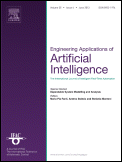
ENGINEERING APPLICATIONS OF ARTIFICIAL INTELLIGENCE
Scope & Guideline
Shaping Tomorrow's Technology Through AI Applications in Engineering
Introduction
Aims and Scopes
- Artificial Intelligence in Engineering Applications:
The journal focuses on the application of artificial intelligence techniques in various engineering domains including mechanical, electrical, civil, and computer engineering, aiming to demonstrate how AI can optimize processes, enhance product designs, and improve operational efficiency. - Interdisciplinary Collaboration:
The journal promotes interdisciplinary research that combines AI with other fields such as materials science, environmental studies, and biomedical engineering, highlighting the versatility of AI technologies. - Methodological Innovations:
It emphasizes novel methodologies in AI, including but not limited to machine learning, deep learning, neural networks, and fuzzy logic, encouraging the development of new algorithms and frameworks to address complex engineering challenges. - Real-world Problem Solving:
The journal seeks to publish studies that not only advance theoretical knowledge but also provide practical solutions to pressing engineering problems, thus contributing to the enhancement of industry practices and standards. - Sustainability and Efficiency:
A significant focus is placed on the application of AI for sustainable engineering practices, promoting methods that improve energy efficiency, reduce waste, and contribute to sustainable development goals.
Trending and Emerging
- Integration of AI with IoT:
There is an increasing focus on the intersection of artificial intelligence and the Internet of Things (IoT), with research highlighting how AI can enhance data processing, predictive maintenance, and real-time decision-making in IoT systems. - Explainable AI (XAI):
A growing trend towards explainable AI methodologies is evident, as researchers seek to create models that not only perform well but also provide insights into their decision-making processes, crucial for applications in safety-critical systems. - Sustainable AI Solutions:
Research emphasizing sustainability through AI applications is on the rise, with studies exploring how AI can contribute to energy efficiency, waste reduction, and environmentally friendly engineering practices. - AI in Autonomous Systems:
There is a notable increase in research related to AI applications in autonomous systems, including drones and self-driving vehicles, focusing on navigation, control, and safety. - Fusion of Multi-modal Data:
Emerging research trends are showing a preference for methods that integrate multi-modal data sources (e.g., visual, auditory, and sensory data) to improve the robustness and accuracy of AI models in various applications.
Declining or Waning
- Traditional AI Techniques:
There has been a noticeable decline in publications focusing solely on traditional AI techniques such as rule-based systems and expert systems, as the field increasingly embraces more complex and adaptive methodologies like deep learning and reinforcement learning. - Basic Data Preprocessing Methods:
Papers that solely discuss basic data preprocessing techniques have diminished, likely due to the growing sophistication in AI methodologies that integrate preprocessing as part of more comprehensive systems. - Isolated Case Studies:
The journal has moved away from publishing isolated case studies that do not connect to broader trends or frameworks, favoring research that demonstrates broader applicability and integration of AI in various engineering contexts. - Theoretical AI without Practical Application:
There is a waning interest in theoretical discussions around AI that lack clear practical applications, as the field shifts towards research that demonstrates tangible benefits and implementations in real-world engineering scenarios.
Similar Journals

Sigma Journal of Engineering and Natural Sciences-Sigma Muhendislik ve Fen Bilimleri Dergisi
Unlocking Potential Through Open Access ResearchSigma Journal of Engineering and Natural Sciences (Sigma Mühendislik ve Fen Bilimleri Dergisi) is a distinguished open-access journal published by Yıldız Technical University in Turkey since 2004. With an emphasis on the interdisciplinary fields of engineering and natural sciences, this journal caters to researchers, professionals, and students seeking to share innovative research and developments. Although currently positioned in the Q4 quartile across several categories including Computational Mechanics and Mechanics of Materials, Sigma is committed to enhancing its scientific impact and accessibility. The journal invites contributions that enrich knowledge in areas of energy and engineering, addressing complex challenges with a regional and global perspective. Researchers can freely access and disseminate their findings, fostering collaborative advancements in the community. By continually striving for excellence, Sigma Journal serves as a crucial platform for scholarly discourse and innovative research in engineering and natural sciences.
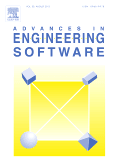
ADVANCES IN ENGINEERING SOFTWARE
Connecting Scholars to the Latest in Engineering Software Advances.ADVANCES IN ENGINEERING SOFTWARE, published by Elsevier Science Ltd, stands at the forefront of interdisciplinary research in the realms of engineering and software development. With an impressive impact factor reflected in its Q1 and Q2 rankings in the Engineering (Miscellaneous) and Software categories, respectively, this journal serves as an essential platform for researchers and practitioners alike to disseminate innovative findings and methodologies from 1982 to the present. Strategically positioned within the United Kingdom, it engages scholars, professionals, and students by publishing high-quality articles that emphasize advancements in software applications related to engineering challenges. Although it does not currently offer open access, the journal remains highly regarded within the academic community, consistently attracting impactful research and maintaining a commendable Scopus ranking within the top tiers of both general engineering and software disciplines. Explore the latest contributions to enhance your knowledge and stay updated on trailblazing developments in engineering software.

Journal of Engineering Science and Technology
Advancing Engineering Knowledge for a Global AudienceThe Journal of Engineering Science and Technology, published by TAYLORS UNIV SDN BHD, is a noteworthy open-access publication dedicated to advancing knowledge across various engineering disciplines. Since its inception in 2006, this journal has provided a vital platform for researchers, professionals, and students to disseminate their findings and innovations in engineering. With a focus on interdisciplinary approaches, it aims to bridge the gap between theoretical studies and practical applications, fostering collaboration among academia and industry. Currently ranked in the Q3 quartile for General Engineering by Scopus, the journal highlights emerging trends and promotes high-quality research in engineering fields. Based in Malaysia, the journal invites contributors worldwide, making it a significant contributor to the global engineering community's discourse. With its ongoing commitment to accessibility and scholarly integrity, the Journal of Engineering Science and Technology continues to play an essential role in shaping the future of engineering research.

Revista Iteckne
Advancing Innovation in Technology and EngineeringRevista Iteckne is a prestigious open access journal published by UNIV SANTO TOMAS since 2009, dedicated to advancing knowledge in the fields of technology and engineering. With a focus on innovative research and practical applications, this journal serves as a vital platform for researchers, professionals, and students seeking to share their findings with a global audience. Operating under the ISSN 1692-1798 and E-ISSN 2339-3483, Revista Iteckne facilitates unrestricted access to its content, promoting the dissemination of scientific information. The journal is committed to fostering interdisciplinary collaboration and addressing contemporary challenges in technology and engineering research. By embracing a rigorous peer-review process, it ensures the quality and integrity of published articles, making it an essential resource for those engaged in advancing technological solutions in various sectors. Based in Bogotá, Colombia, the journal plays a significant role in enriching the academic landscape of Latin America and beyond.
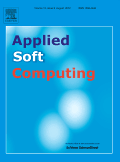
APPLIED SOFT COMPUTING
Pioneering research in the realm of soft computing.Applied Soft Computing is a premier international journal published by Elsevier, dedicated to advancing the field of soft computing in various applications. With an ISSN of 1568-4946 and E-ISSN of 1872-9681, it has established itself as a leading resource with a commendable impact factor and significant importance in its field. As of 2023, it ranks in the Q1 category of Software in Scopus, boasting a rank of 25 out of 407 journals in Computer Science, Software, representing the 93rd percentile among peers. The journal's primary objective is to publish high-quality, innovative research articles that explore soft computing methodologies and their applications across diverse domains, fostering interdisciplinary collaboration and advancing technological solutions. Based in the Netherlands, at Radarweg 29, 1043 NX Amsterdam, it serves as a vital platform for researchers, professionals, and students eager to contribute to and stay informed about the latest developments in soft computing.
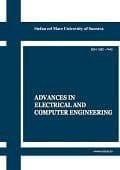
Advances in Electrical and Computer Engineering
Pioneering the Future of Technology and EngineeringAdvances in Electrical and Computer Engineering is a leading open-access journal published by the University of Suceava, Faculty of Electrical Engineering, since 2007, promoting the dissemination of innovative research in the fields of electrical engineering and computer science. With an ISSN of 1582-7445 and an E-ISSN of 1844-7600, the journal serves as a vital resource for researchers, professionals, and students, contributing to the growth of knowledge and technology in these critical areas. The journal holds a respectable Q3 ranking in both Computer Science and Electrical and Electronic Engineering, reflecting its commitment to quality and relevance in high-impact research. Recognized in Scopus, it ranks #154 out of 232 in General Computer Science and #528 out of 797 in Electrical and Electronic Engineering, indicating its solid standing in the academic community. By providing open access to invaluable research findings, Advances in Electrical and Computer Engineering plays a pivotal role in advancing the frontiers of technology and engineering.
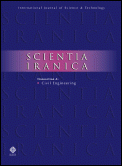
Scientia Iranica
Advancing multidisciplinary research for a brighter tomorrow.Scientia Iranica is a multidisciplinary journal published by SHARIF UNIVERSITY OF TECHNOLOGY, serving as a vital platform for researchers and professionals in the fields of Chemistry, Civil and Structural Engineering, Computer Science, Engineering, Industrial and Manufacturing Engineering, Materials Science, Mechanical Engineering, and Physics and Astronomy. Established in 1999 and converging until 2024, the journal has swiftly ascended in the academic realm, achieving a commendable status with several Q3 classifications across a variety of disciplines and a Q2 in Engineering (miscellaneous) in its 2023 quartile rankings. With its notable Scopus Ranks reflecting a consistent percentile presence in several categories, Scientia Iranica emphasizes rigorous peer-reviewed research and cutting-edge findings, thereby contributing substantially to the advancement of knowledge in its areas of focus. Although not available as open access, the journal remains essential, offering critical insights and fostering collaboration among scholars in Iran and globally, thus enhancing the visibility and impact of innovative research outcomes.
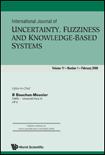
INTERNATIONAL JOURNAL OF UNCERTAINTY FUZZINESS AND KNOWLEDGE-BASED SYSTEMS
Innovating systems that thrive in ambiguity and knowledge.Welcome to the INTERNATIONAL JOURNAL OF UNCERTAINTY FUZZINESS AND KNOWLEDGE-BASED SYSTEMS, a prestigious publication dedicated to advancing the fields of artificial intelligence, control systems engineering, information systems, and software research. Published by WORLD SCIENTIFIC PUBL CO PTE LTD in Singapore, this journal serves as a vital forum for the dissemination of innovative theories, methodologies, and applications rooted in the coexistence of uncertainty and fuzziness within knowledge-based systems. With its ISSN 0218-4885 and E-ISSN 1793-6411, the journal consistently ranks in the Q3 category across various Scopus categories, including Control and Systems Engineering and Information Systems, reflecting its influential position in the academic community. Researchers and practitioners alike will find valuable insights and the latest trends through its comprehensive articles, making this journal an essential resource for those seeking to navigate the complexities of this evolving field.
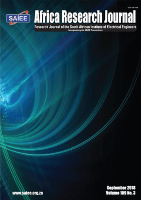
SAIEE Africa Research Journal
Fostering Collaboration in Electrical Engineering Excellence.SAIEE Africa Research Journal, published by the South African Institute of Electrical Engineers, is a pivotal platform for innovative and impactful research in the fields of electrical engineering and related disciplines. Embracing an Open Access model since 2022, this journal ensures that high-quality research is readily accessible to a global audience, thereby fostering collaboration and knowledge sharing among researchers, professionals, and students alike. With the ISSN 1991-1696, the journal aims to address significant challenges and advancements within the African context and beyond, highlighting local and international studies that contribute to the development of the engineering sector. By maintaining a commitment to rigorous peer review and interdisciplinary dialogue, the SAIEE Africa Research Journal stands out as an essential resource for those seeking to advance their understanding and expertise in electrical engineering and technology.
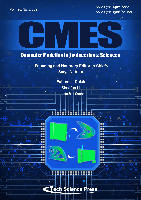
CMES-COMPUTER MODELING IN ENGINEERING & SCIENCES
Fostering Collaboration in Computational MethodologiesCMES-COMPUTER MODELING IN ENGINEERING & SCIENCES is a premier journal published by Tech Science Press, dedicated to advancing knowledge in the fields of computer science applications, modeling and simulation, and software engineering. With an impressive convergence of research from 2000 to 2024, this journal stands out as a vital resource for researchers, professionals, and students alike, fostering innovation and collaboration in computational methodologies. The journal currently holds a Q3 category ranking in multiple disciplines according to the latest metrics, including Scopus, which reflects its growing significance in the academic community. By providing a platform for high-quality research and open discourse, CMES aims to enhance the understanding of complex systems through effective modeling techniques and computational tools. Despite its current classification under open access, the journal remains a cornerstone for those looking to deepen their expertise in cutting-edge computational engineering and science.